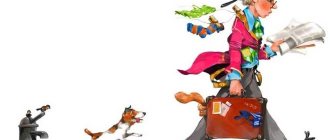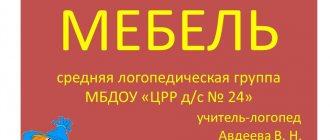Goals:
Educational: consolidate the concept of professions and their activities; expand the concept of the benefits of professions for others; activate children's active vocabulary with nouns, adjectives, verbs on the topic of the lesson; continue to learn how to compose sentences using a basic scheme.
Developmental: continue to develop speech breathing, articulatory, finger, general motor skills; continue to develop the ability to connect movements and words using speech therapy rhythms.
Educational: to cultivate in children a respectful, kind attitude towards others; develop the ability to work in a group; promote the development of thinking, memory, curiosity, observation.
Progress of the lesson:
- Organizing time.
Hello, hello, dear friend!
Hello, look around!
Smile softly at me!
Bow to the guest too!
Hello guys! I am very glad to see you today, how beautiful you all are. How are you feeling? Amazing! Today we have an unusual lesson, today we will show our guests what we learned in the last lesson. Who can tell me what topic we covered? That's right, "Professions". What is this, a profession?
Kesha the Clown runs in to the music, disrupting the class.
- Hello, where did you come from such a hooligan?
- Hello! My name is Kesha, I love to sing and dance!
- What about studying?
“But I don’t like studying, it’s boring.”
- Ay - yay! Guys, (the speech therapist addresses the children) do you like to study with me? (Children's answers)
- Oh, you know a lot.
- But there are many, for example, Kesha, do you know what a Profession is?
- Of course I know, (addresses the children) this is such an animal! No? Could this be such a bird? Also no? Ah, I understand, this is such a dance!
- Guys, let's not torment Kesha and tell him what a Profession is (children's answers).
- How interesting, what do they do?
- Stay with us and you will find out everything (Kesha sits down with the guests).
- Main part
To begin with, guys, look at these tables, this is the workplace of each profession, let's name each profession and remember who does what and what they do (children find out, name the profession from the picture and answer the question “what does it do?/What does it do?” ). I have a large basket with objects for you, let's take it apart, take one instrument at a time and put it on the desired table (to the music, the children take one object at a time and take it to the tables - the workplaces of the professions). What a great fellow you are, and now I’m going to check (the speech therapist comes to the tables and names each item together with the children). Well, that's it, we're done!
Working on speech exhalation. Speech therapy rhythm.
Guys, you dismantled the basket so quickly and were probably very tired. Let's take a little rest together. Kesha, do you want to join us? (the melody “Beautiful Bird Singing” plays, everyone stands in a circle). On the count of “one” we inhale air through the nose, and on the count of “two” we exhale it through the mouth. Ready?
“one” - inhale, “two” - exhale,
“one” - inhale and raise your arms up,
“two” - exhale, lower the arms,
“one” - inhale, raise your arms and stand on your toes, reach for the sun,
“two” - exhale and lower.
Did you guys like it? What about you, Kesha? Great! Then let us continue our lesson.
Children, now look what is on this table? (the speech therapist leads the children to the table on which the hats lie). That's right, these are the hats of our professions. Whose headdress is this? (speech therapist shows hats, children answer the question “Whose?”). Well done guys, you guessed everyone. Who wants to try them on now? Everybody wants? Well, then choose! (speech therapist distributes hats)
Who wants to be a builder?
Who wants to be a hairdresser?
Who wants to be a doctor?
Who wants to be a chef?
Role-playing game "Let's go for a visit."
And now, guys, I have a very interesting game for you. It's called "Let's go for a visit." We need a magic bag to find out who and where we are going (children take turns taking one colored envelope from the magic bag). So, let's find out who we're going to visit? (the color of the envelope determines the profession; if they go to visit a doctor, then the child who put on the doctor’s headdress in the previous task plays the role of a doctor, etc.).
I have another envelope for you, let’s see with you who we are going to visit this time? (envelope with the profession of speech therapist). That's right guys, speech therapist is my job, this is my profession. Well, since you guessed it, I ask you to come visit me (the children sit at the table to do articulation gymnastics). Kesha, I invite you too.
Author's articulation gymnastics M.I. Lynskaya.
Guys, when you come to my office, where do we start our lesson? That's right, with gymnastics for our tongue. Today our gymnastics will be unusual, we have never done anything like this before. Here are very interesting baskets with unusual objects, I will show you how you can work with them (objects for articulatory motor skills are taken from the basket).
| Exercise name | Instructions |
| "Hairdryer" | Inhale through the nose, exhale through the mouth onto the doll's hair. |
| "Skinny carrot" | Cheek retraction |
| "Berry Hats" | Tearing off pieces of colored paper cut in the shape of berries with your lips |
| "Bridge over the river" | Hold the cotton swab between your upper lip and nose, raise and lower your head, turn your head to the right, then to the left. |
| "Comb" | Running the tip of the tongue from side to side along the serrated part of the comb |
| "Orange juice" | Cut the orange into rings. Lick the slice in a circle, clockwise and then counterclockwise. |
| "Landaging" | Rolling a sterile gauze swab from cheek to cheek and then pushing it out of the mouth |
- Lesson summary
Well, guys, our lesson has come to an end. Did you like it?
- Did you like it, Kesha?
- Yes, thank you very much, guys. Learning is not boring at all, but useful. Now I will never be lazy. And this is to you, children, for being so smart, kind, for teaching me a lot today (sweets for children). Goodbye guys, I'm off to study!
General recommendations for conducting speech therapy classes on the topic “Professions” in a preschool educational institution
When conducting a speech therapy session “Professions”, it is important to take into account the characteristics of children’s perception. Children do not yet have self-discipline skills. Therefore, it is important that the activity is playful in nature and captivates them.
Developmental activities for classes
When conducting classes, not only games can be used that expand the children’s knowledge, but also exercises to learn how to correctly pronounce sounds in words and improve speech skills. It is recommended that you plan your children's learning in the coming weeks.
Games on the topic: “Professions”
In this case, riddles and questions are asked, the answers to which expand the children’s knowledge about various specialties. Sometimes false statements are made so that kids will find a mistake.
Stories relating to various specialties are compiled.
List of reading materials for the group
When lexical topics in speech therapy related to professions are considered, for example, reading the following works can be used to work with children:
- J. Rodari “What color are the crafts.”
- Y. Akim “Neumeika”.
- A. Shibarev “Mailbox”.
Note! Reading and discussing works of fiction will help children better understand the topic they are studying. It is useful if such readings are additionally carried out by their parents at home.
Thematic physical education minute
The following describes one example of physical education.
Kids perform movements while the teacher reads the poem “Postman”:
What the postman brought us (Clenches his fists)
He walks around with a thick bag
Translation, magazine, newspaper
There are two cassettes in the parcel (Kids straighten and bend their fingers)
And a letter from Aunt Valya
So that they await her arrival (Hands spread to the sides).
Gymnastic exercises
Typically, physical exercises and finger gymnastics are used during classes. At the same time, the teacher reads a poem related to the topic under consideration. At certain moments, children perform movements that relate to the spoken phrases. If necessary, the teacher tells you what to do.
Using interactive whiteboards and ICT in the learning process
The use of ICT makes it possible to offer children exciting educational computer games.
For example, they may be offered pictures of people and objects that they use in their work. At the same time, children will have to describe in words what is shown in the pictures and write a short story about this profession. The use of computer technology can expand the learning opportunities for preschool children. However, it is necessary to teach children to work with it in subgroup classes.




